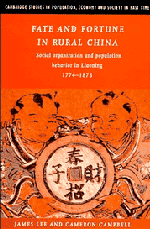Book contents
- Frontmatter
- Contents
- List of figures
- List of maps
- List of tables
- Acknowledgements
- PART 1 DAOYI VILLAGE
- PART 2 THE LIAONING DEMOGRAPHIC SYSTEM
- PART 3 HOUSEHOLD ORGANIZATION AND POPULATION BEHAVIOR
- PART 4 BANNER ORGANIZATION AND POPULATION BEHAVIOR
- 8 Bannermen and banner organization
- 9 Banner hierarchy and demographic privilege
- 10 Two types of social mobility
- EPILOGUE: PROSPECTS, IMPLICATIONS, AND COMPARISONS
- Appendices
- Glossary
- References
- Index
- Cambridge Studies in Population, Economy and Society in Past Time
10 - Two types of social mobility
Published online by Cambridge University Press: 20 October 2009
- Frontmatter
- Contents
- List of figures
- List of maps
- List of tables
- Acknowledgements
- PART 1 DAOYI VILLAGE
- PART 2 THE LIAONING DEMOGRAPHIC SYSTEM
- PART 3 HOUSEHOLD ORGANIZATION AND POPULATION BEHAVIOR
- PART 4 BANNER ORGANIZATION AND POPULATION BEHAVIOR
- 8 Bannermen and banner organization
- 9 Banner hierarchy and demographic privilege
- 10 Two types of social mobility
- EPILOGUE: PROSPECTS, IMPLICATIONS, AND COMPARISONS
- Appendices
- Glossary
- References
- Index
- Cambridge Studies in Population, Economy and Society in Past Time
Summary
Throughout Chinese history, heredity and ability inevitably overlap. On the one hand, the Chinese state rewarded achievement with hereditary rights and privileges. On the other hand, Chinese parents rewarded what ability their children had, through a system of familial education and parental, especially maternal, dedication (Hsiung 1994). As a result, in late imperial China, as in contemporary China, nurture could supply what nature lacked. Privileged children consequently often did far better than other children their age.
This was especially true in rural Liaoning, where position in the traditional household hierarchy was dictated largely by heredity. Bannermen followed a life course from one family relationship to another in a fixed progression determined at the time of their birth by their parentage and their birth order. The timing of relationship transitions depended on two events over which individuals had virtually no control: when household heads died, and when households divided. In consequence, within the household system there was little opportunity for social mobility.
In contrast, there was considerable mobility outside the household in the banner hierarchies of occupation and organization. According to the rules and regulations of the banner system, bannermen could earn position in the occupational and organizational hierarchies through their ability, regardless of their position in the household hierarchy. Under ideal circumstances, talented men fated by the circumstances of their birth to a life at the bottom of the household hierarchy could still rise in social mobility. In rural Liaoning, the Eight Banners, in other words, could have been the rural equivalent of the elite “ladder of success” (Ho 1959).
- Type
- Chapter
- Information
- Fate and Fortune in Rural ChinaSocial Organization and Population Behavior in Liaoning 1774–1873, pp. 196 - 214Publisher: Cambridge University PressPrint publication year: 1997



